If you're looking to ease anxiety, try these seven herbal tea blends. Start with chamomile and lavender for relaxation. Lemon balm and peppermint boost your mood while soothing nerves. For a calming kick, mix ashwagandha with ginger. Valerian root and passionflower create a peaceful night ritual. Green tea with hibiscus offers antioxidants that reduce stress. Tulsi and rose petals provide a fragrant comfort perfect for meditation. Finally, skullcap and lemon verbena help calm racing thoughts. These blends not only taste great but also promote a sense of well-being, making them well worth a sip or two. Explore more to find your favorites!
Chamomile and Lavender Blend
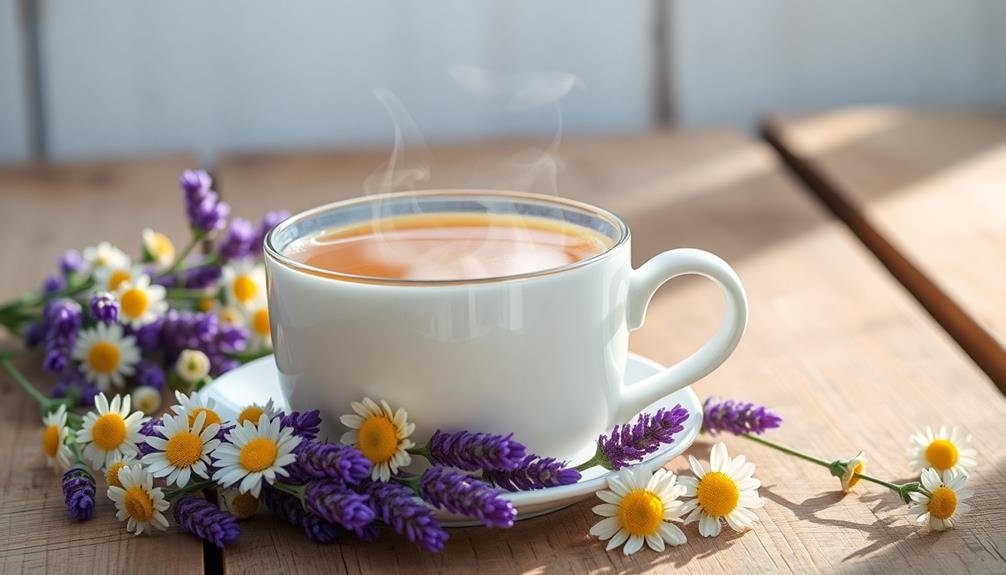
When you need a moment of calm, the chamomile and lavender blend can be your perfect companion. This soothing herbal tea is renowned for its ability to ease anxiety and promote relaxation.
Chamomile, a well-known herb, works by reducing stress and enhancing sleep quality. Its gentle sedative properties can help you unwind after a long day, making those restless nights a thing of the past.
Lavender adds another layer of tranquility to this blend. Its fragrant aroma not only smells delightful but also has a calming effect on the mind and body. Studies have shown that inhaling lavender can reduce heart rate and blood pressure, creating a sense of peace.
Together, chamomile and lavender create a powerful duo that can help you escape the chaos of everyday life.
To brew the perfect cup, steep a chamomile and lavender tea bag or loose leaf blend in hot water for about five minutes. You can enjoy it plain or add a touch of honey for sweetness.
Sip slowly, allowing the warm liquid to soothe your senses. With each cup, you'll find yourself drifting closer to serenity, ready to embrace the calm.
Lemon Balm and Peppermint
Lemon balm and peppermint tea is a revitalizing blend that can work wonders for your anxiety. This combination not only offers an invigorating taste but also packs a punch when it comes to soothing your nerves.
Lemon balm, known for its calming properties, helps reduce stress and promotes a sense of well-being. It's perfect for those moments when you feel overwhelmed.
Peppermint, on the other hand, brings a cooling sensation that can clear your mind and enhance focus. Its uplifting aroma can elevate your mood and help alleviate feelings of anxiety.
When you brew these two herbs together, you create a fragrant, flavorful tea that can instantly uplift your spirits.
To prepare this tea, steep one teaspoon of dried lemon balm and one teaspoon of dried peppermint in hot water for about 5–10 minutes. You can sweeten it with honey or enjoy it plain.
Sipping this blend during a hectic day or before bedtime can help relax your mind and body, making it an excellent addition to your daily routine. Give it a try, and you might find yourself feeling more balanced and at ease.
Ashwagandha and Ginger Tea
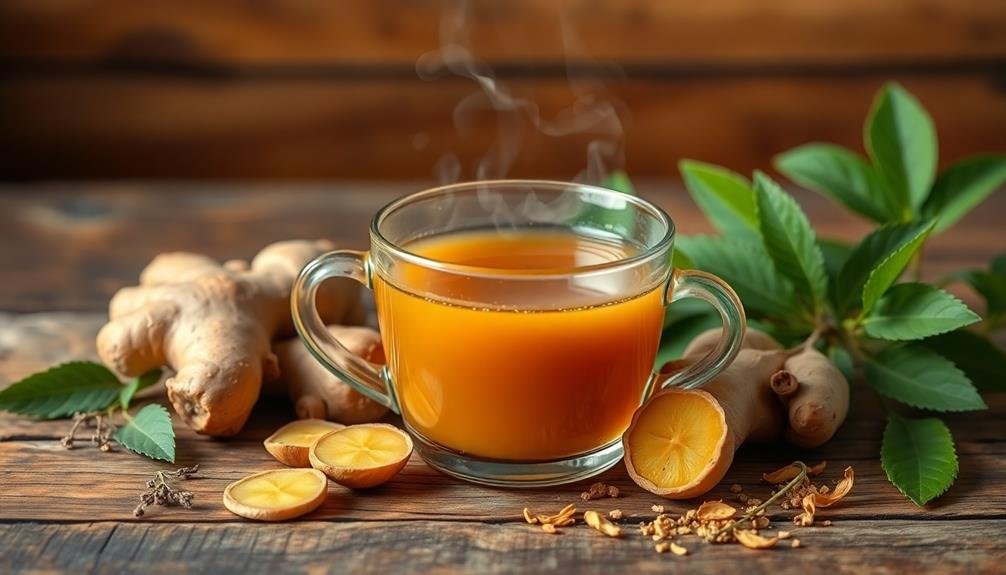
Ashwagandha and ginger tea offers a powerful combination of health benefits that can help ease anxiety and promote overall wellness.
You'll find that preparing this tea is simple, and it pairs well with various flavors to enhance your experience.
Let's explore the advantages, tips for making it, and some delicious flavor pairings you can try!
Health Benefits Overview
In today's fast-paced world, many people turn to herbal remedies for relief from anxiety, and a blend of Ashwagandha and ginger tea stands out for its impressive health benefits.
Ashwagandha, an adaptogenic herb, helps your body manage stress by regulating cortisol levels. This means you can experience reduced anxiety and a greater sense of calm.
Ginger adds another layer of wellness to this tea. It's known for its anti-inflammatory properties, which can help ease physical tension and discomfort that often accompany anxiety.
Plus, ginger aids digestion, making it a great choice for those who might feel a bit queasy when stressed.
Together, Ashwagandha and ginger create a powerful synergy that not only promotes mental clarity but also supports overall well-being.
Drinking this tea regularly can enhance your mood, boost your immune system, and improve your sleep quality.
Preparation Tips
To easily prepare a soothing cup of Ashwagandha and ginger tea, start by gathering your ingredients.
You'll need one teaspoon of dried Ashwagandha root, one teaspoon of freshly grated ginger, and two cups of water. Optional additions include a sweetener like honey or a splash of lemon juice for extra flavor.
Begin by boiling the two cups of water in a medium saucepan. Once the water reaches a rolling boil, reduce the heat to a simmer and add the Ashwagandha and grated ginger.
Let the mixture simmer for about 10 to 15 minutes, allowing the flavors to meld. If you prefer a stronger flavor, you can simmer it for a few extra minutes.
After the tea has steeped to your liking, strain it into your favorite mug to remove the solid ingredients.
If you're using sweetener or lemon juice, add those now to enhance the taste. Give it a gentle stir, and your Ashwagandha and ginger tea is ready to enjoy.
Sip slowly, allowing the calming properties of the herbs to wash over you and help ease your anxiety.
Flavor Pairing Suggestions
When crafting your Ashwagandha and ginger tea, consider enhancing its flavor profile with complementary ingredients that not only taste great but also boost its calming effects.
Fresh lemon juice adds a zesty brightness, balancing the earthy notes of ashwagandha and the warmth of ginger. A drizzle of honey or maple syrup can sweeten the blend naturally, making each sip feel indulgent while supporting relaxation.
You might also try adding a sprinkle of cinnamon. This spice not only enhances flavor but also has anti-inflammatory properties, making your tea even more healthful.
If you enjoy a bit of floral essence, consider adding dried chamomile or lavender. Both add calming scents and flavors that can deepen your relaxation experience.
For a revitalizing twist, a few mint leaves can uplift the entire concoction, providing a cooling contrast to the spicy ginger.
Finally, if you're feeling adventurous, a pinch of turmeric can amplify the health benefits while contributing a rich color and slight earthiness to the brew.
Experiment with these pairings to find your ideal blend, and enjoy the soothing moments they bring to your day.
Valerian Root and Passionflower
If you're looking for a natural way to ease anxiety, valerian root and passionflower might be just what you need.
Valerian root is known for its ability to promote relaxation and improve sleep quality, while passionflower offers calming effects that can help soothe your mind.
Together, these herbs create a comforting tea blend that supports your mental well-being.
Benefits of Valerian Root
Valerian root, often combined with passionflower, offers a powerful natural remedy for anxiety relief and improved sleep quality. This herbal powerhouse has been used for centuries to calm restless minds and promote relaxation.
When you incorporate valerian root into your routine, you'll likely experience several benefits that can greatly enhance your well-being.
- Reduced Anxiety: Valerian root helps lower stress levels, making it easier to manage daily challenges and feel more at ease in social situations. You'll notice a greater sense of calm wash over you.
- Better Sleep: Struggling with insomnia? Valerian root may help improve your sleep quality. By promoting deeper, more restful sleep, it can leave you feeling refreshed and ready to tackle the day.
- Less Muscle Tension: Valerian root has natural soothing properties that can help relieve muscle tension. You'll feel more relaxed and comfortable, allowing you to unwind after a long day.
Incorporating valerian root into your herbal tea blends can be a game-changer, helping you reclaim your peace of mind and enjoy restful nights.
Passionflower's Calming Effects
Passionflower is a standout herb known for its calming effects, especially when paired with valerian root. This powerful combination creates a soothing tea that helps ease anxiety and promote relaxation. When you brew a cup, you're not just enjoying a warm drink; you're inviting tranquility into your day.
Passionflower works by increasing levels of gamma-aminobutyric acid (GABA) in your brain, which helps reduce nerve activity and calms your mind. This can be particularly helpful during stressful moments or when you're winding down for the night.
Valerian root complements this effect, enhancing the calming properties and helping you drift into a restful sleep.
As you sip your passionflower and valerian root tea, you'll likely notice a decrease in racing thoughts and a sense of peace enveloping you. The floral notes of passionflower combined with the earthy flavor of valerian make for a delightful experience.
Green Tea With Hibiscus
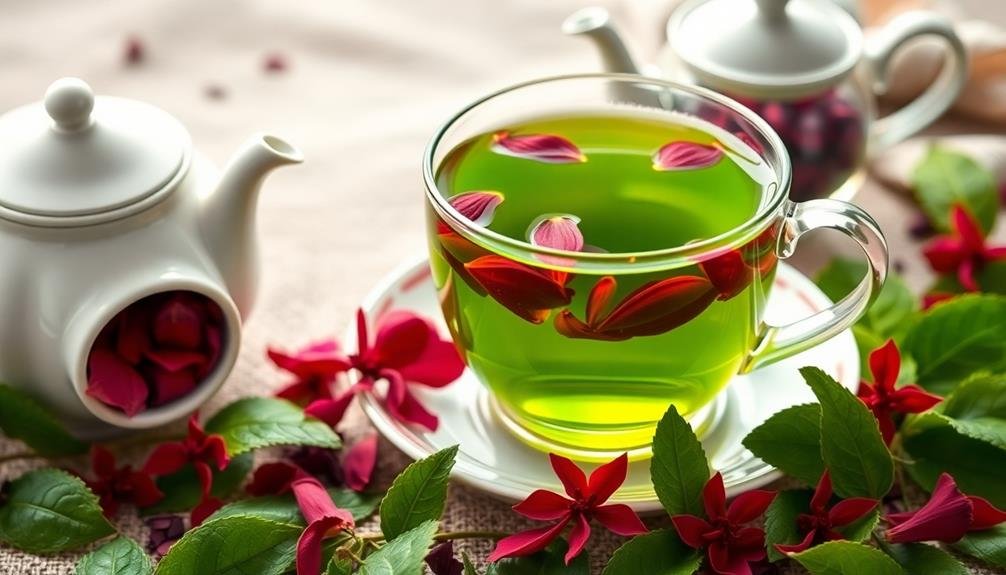
The uplifting combination of green tea and hibiscus offers a unique way to combat anxiety while indulging your senses. This delightful blend not only tastes invigorating but also packs a punch with its calming properties.
Green tea is known for its L-theanine content, which helps soothe your mind, while hibiscus adds a tart flavor and an array of health benefits.
When you sip on green tea with hibiscus, you can experience:
- A burst of flavor: The tangy notes of hibiscus perfectly balance the earthy undertones of green tea, creating a tantalizing experience for your taste buds.
- A boost in mood: Both ingredients are rich in antioxidants, which may help reduce stress levels and enhance your overall mood.
- A moment of mindfulness: Taking time to brew and enjoy this tea can serve as a calming ritual, allowing you to pause and reconnect with yourself amidst a busy day.
Tulsi and Rose Petals
Tulsi and rose petals create a soothing tea blend that's perfect for calming your mind and uplifting your spirit. Tulsi, also known as holy basil, has been cherished for centuries for its stress-relieving properties. When combined with rose petals, this blend offers not just a delightful aroma but also a symphony of benefits that can help alleviate anxiety.
To prepare this calming tea, start by steeping fresh or dried tulsi leaves and a handful of rose petals in hot water for about 5 to 10 minutes. The result is a fragrant infusion that can help you unwind after a hectic day.
You'll notice the gentle sweetness of the rose petals balancing the earthy tones of tulsi, creating a harmonious flavor profile.
Drinking this herbal tea regularly can support emotional well-being and promote relaxation. You might even find it a perfect companion for your meditation practice or a cozy evening at home.
Plus, adding a touch of honey can enhance the taste while providing additional soothing qualities. So go ahead, brew a cup of tulsi and rose petal tea, and let its calming effects wash over you. You deserve this moment of tranquility.
Skullcap and Lemon Verbena
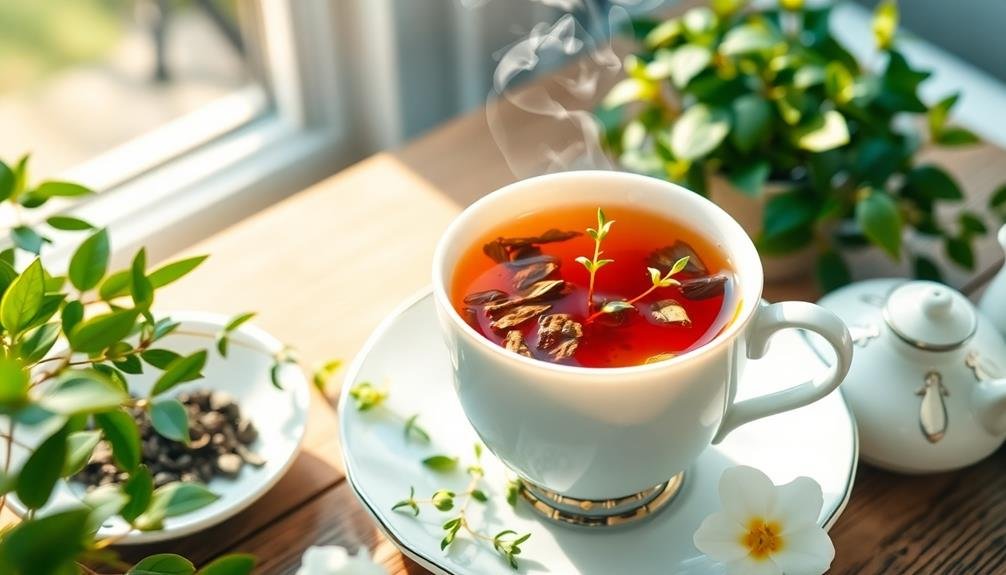
When seeking relief from anxiety, a blend of skullcap and lemon verbena offers a revitalizing approach. Skullcap, known for its calming properties, helps ease tension and promote relaxation. Lemon verbena adds a rejuvenating citrusy flavor while enhancing your mood and reducing stress. Together, they create a soothing tea that not only tastes delightful but also supports emotional well-being.
Here's what makes this herbal blend so special:
- Natural Calm: Skullcap works gently to quiet your racing thoughts, allowing you to unwind and find peace in the moment.
- Uplifting Aroma: The bright, lemony scent of verbena can instantly lift your spirits and create a sense of joy, making it perfect for those tough days.
- Holistic Benefits: Both herbs are packed with antioxidants, promoting overall health while targeting anxiety, so you can feel your best inside and out.
Brewing a cup of skullcap and lemon verbena tea can be a simple yet powerful ritual. As you sip, you'll feel the worries of the day melt away, leaving you invigorated and ready to embrace life's challenges.
Frequently Asked Questions
Can Herbal Teas Replace Medication for Anxiety Treatment?
Herbal teas can offer calming effects, but they shouldn't replace prescribed medication without consulting your doctor. You can explore them as a complementary approach, but prioritize professional guidance for your anxiety treatment plan.
How Often Should I Drink Anxiety-Busting Herbal Teas?
You should drink anxiety-busting herbal teas daily for best results. Start with one to two cups in the morning and evening. Adjust based on your needs, enjoying the calming benefits while maintaining a healthy routine.
Are There Any Side Effects of These Herbal Blends?
Yes, herbal blends can cause side effects like drowsiness, digestive issues, or allergic reactions. It's important to consult a healthcare professional before trying new blends, especially if you're taking medications or have underlying health conditions.
Can I Combine Different Herbal Teas for Anxiety Relief?
Yes, you can combine different herbal teas for anxiety relief. Mixing calming herbs like chamomile and lavender can enhance their soothing effects. Just be mindful of any potential interactions and start with small amounts to see how you feel.
What Is the Best Time of Day to Drink These Teas?
The best time to drink herbal teas is in the evening or before bed. They can help you unwind and prepare for sleep. Enjoy a cup when you need to relax and calm your mind.
In Summary
Now that you know these seven anxiety-busting herbal tea blends, it's time to brew up some comfort. Whether you prefer the soothing chamomile and lavender or the invigorating lemon balm and peppermint, each blend offers its unique benefits. Experiment with different combinations to find your perfect cup. As you sip, let the calming properties wash over you, bringing peace to your day. So go ahead, take a moment for yourself and enjoy these delightful brews!

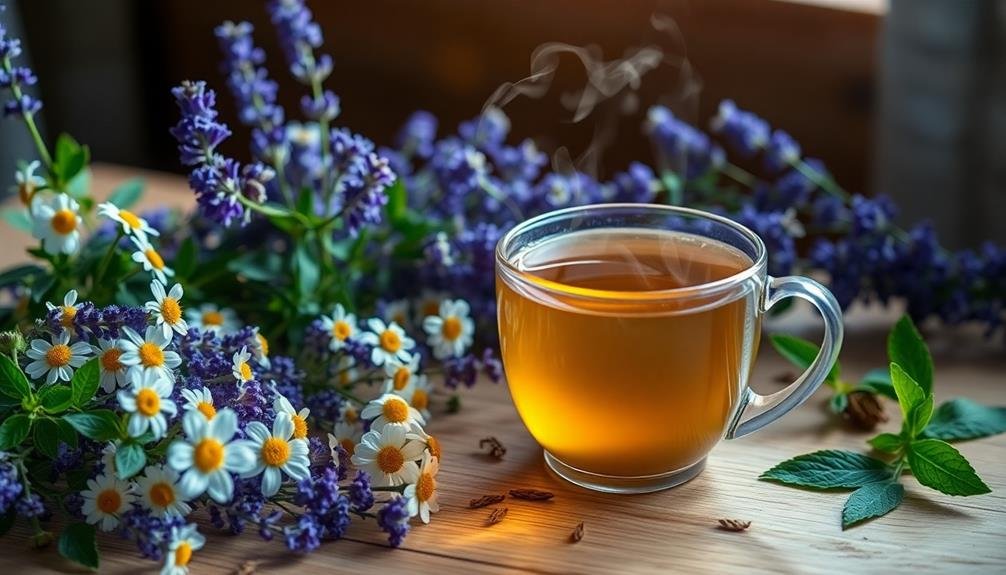

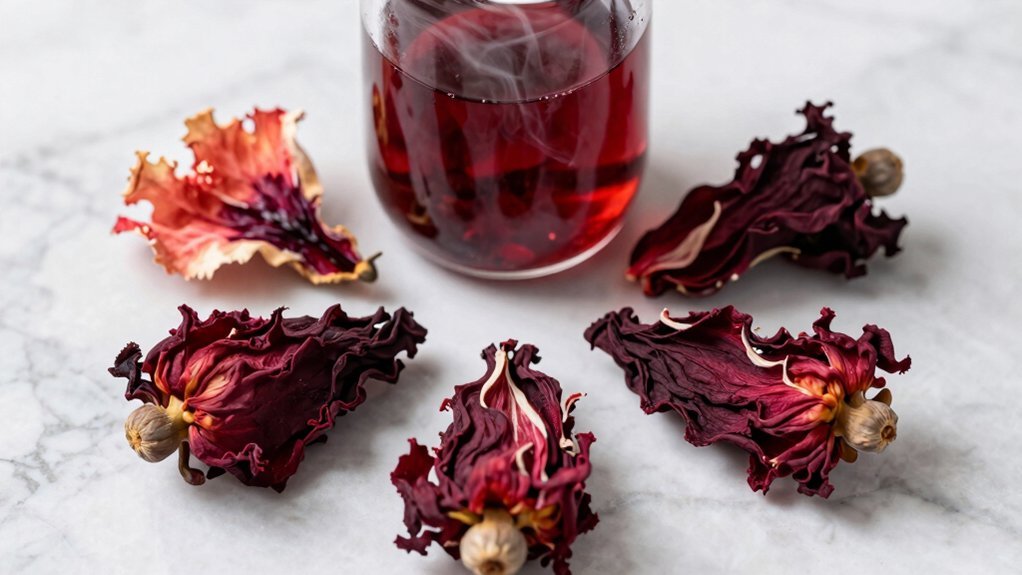

Leave a Reply